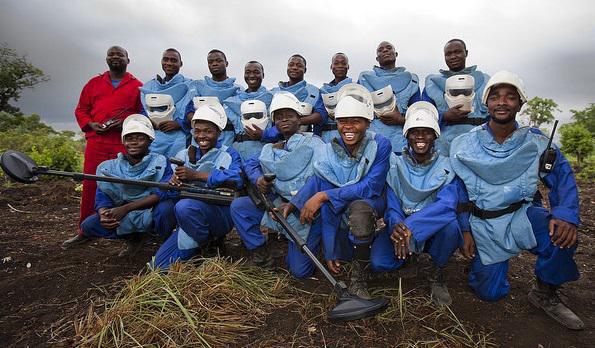After decades of work, Mozambique declares itself free of landmines


A free daily email with the biggest news stories of the day – and the best features from TheWeek.com
You are now subscribed
Your newsletter sign-up was successful
It took more than 20 years, but Mozambique is now officially free of landmines.
The HALO Trust, a British charity, said Thursday that since 1993, it has cleared more than 171,000 landmines from 1,100 minefields across the country. Landmines were first planted in the 1960s during a war for independence from Portugal, which was followed by a civil war. They were placed around dams and railroads, usually about 5 centimeters (2 inches) underground. The government does not know how many people have been killed or injured by landmines in Mozambique, but Human Rights Watch estimates that 8,000 amputees have received medical treatment and thousands more have been killed or did not seek help, Al Jazeera reports.
The last known landmine was destroyed on Wednesday, and while there are likely single mines still in Mozambique, officials say they don't expect to find a minefield. Nguila Nhamposse, 78, lost his leg in 1993 after he stepped on a landmine while trying to recover the body of a neighbor who died after triggering a mine. He says his wife left him because he couldn't provide for his family, and that it's been difficult for him to do simple tasks like carry water for a shower. He would not comment on the people who buried the landmines, but was grateful for the HALO Trust. "All I can say is thank you to the people who removed the mines," he told The Guardian. "It was not only for me but for everyone here."
The Week
Escape your echo chamber. Get the facts behind the news, plus analysis from multiple perspectives.

Sign up for The Week's Free Newsletters
From our morning news briefing to a weekly Good News Newsletter, get the best of The Week delivered directly to your inbox.
From our morning news briefing to a weekly Good News Newsletter, get the best of The Week delivered directly to your inbox.
A free daily email with the biggest news stories of the day – and the best features from TheWeek.com
Catherine Garcia has worked as a senior writer at The Week since 2014. Her writing and reporting have appeared in Entertainment Weekly, The New York Times, Wirecutter, NBC News and "The Book of Jezebel," among others. She's a graduate of the University of Redlands and the Columbia University Graduate School of Journalism.
-
 6 of the world’s most accessible destinations
6 of the world’s most accessible destinationsThe Week Recommends Experience all of Berlin, Singapore and Sydney
-
 How the FCC’s ‘equal time’ rule works
How the FCC’s ‘equal time’ rule worksIn the Spotlight The law is at the heart of the Colbert-CBS conflict
-
 What is the endgame in the DHS shutdown?
What is the endgame in the DHS shutdown?Today’s Big Question Democrats want to rein in ICE’s immigration crackdown
-
 Nobody seems surprised Wagner's Prigozhin died under suspicious circumstances
Nobody seems surprised Wagner's Prigozhin died under suspicious circumstancesSpeed Read
-
 Western mountain climbers allegedly left Pakistani porter to die on K2
Western mountain climbers allegedly left Pakistani porter to die on K2Speed Read
-
 'Circular saw blades' divide controversial Rio Grande buoys installed by Texas governor
'Circular saw blades' divide controversial Rio Grande buoys installed by Texas governorSpeed Read
-
 Los Angeles city workers stage 1-day walkout over labor conditions
Los Angeles city workers stage 1-day walkout over labor conditionsSpeed Read
-
 Mega Millions jackpot climbs to an estimated $1.55 billion
Mega Millions jackpot climbs to an estimated $1.55 billionSpeed Read
-
 Bangladesh dealing with worst dengue fever outbreak on record
Bangladesh dealing with worst dengue fever outbreak on recordSpeed Read
-
 Glacial outburst flooding in Juneau destroys homes
Glacial outburst flooding in Juneau destroys homesSpeed Read
-
 Scotland seeking 'monster hunters' to search for fabled Loch Ness creature
Scotland seeking 'monster hunters' to search for fabled Loch Ness creatureSpeed Read
